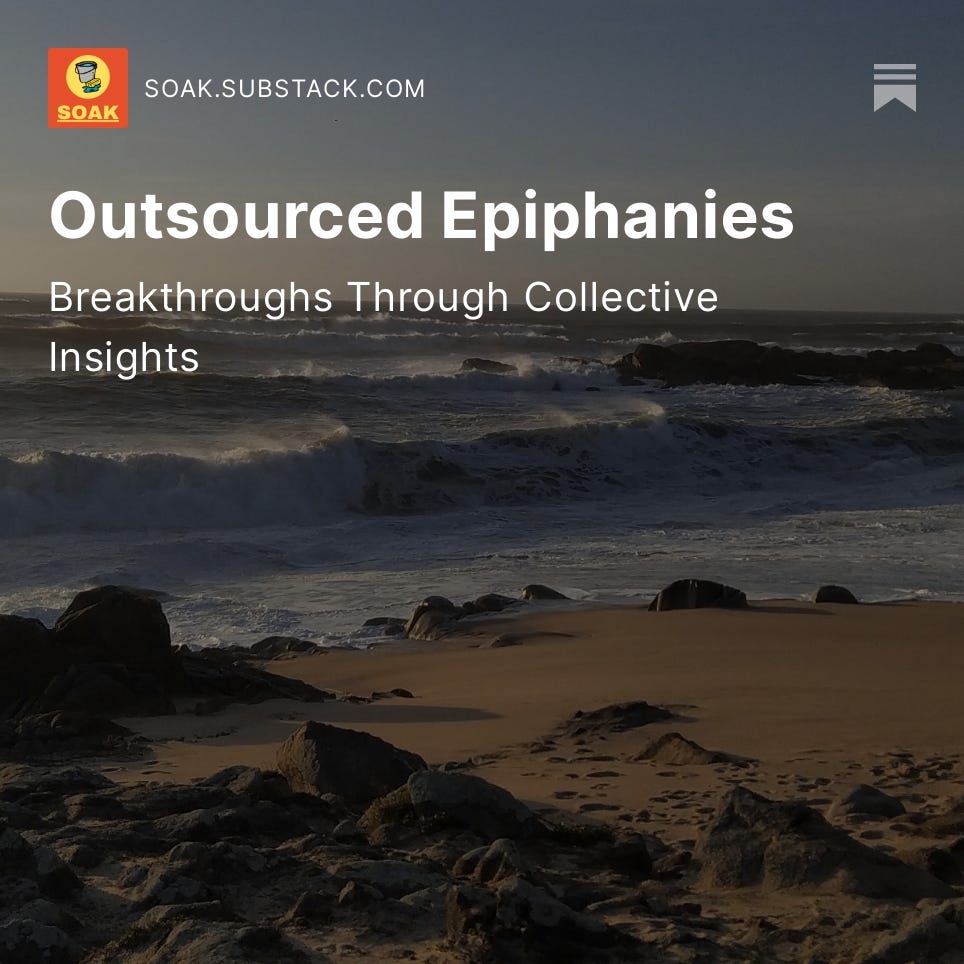SOAK #12
This week on SOAK: Courses, Frameworks, and Razors
(Read this on the web browser if you prefer)
Hey friends!
Have you missed me?
Make sure to follow me on Twitter and Notes to avoid such unbearable feelings!😁
What have you been doing? Have you realized that we are already in the second half of the year!?😮
Have you accomplished some goals yet, or experienced something remarkable?
I’m confident that this semester will be memorable for me (🤞), and it would be great if it was for you too!
Let’s get Soaked!
🧽 What I’m Soaking In
Earlier this month, I participated in Write of Passage's inaugural Writing Sprint, an intensive class designed to take you from idea to publishing in just 7 hours. It was a challenging yet fun experience, especially for someone like me who typically takes 2 or 3 days to get an article ready for publication. However, it also reinforced the importance of working on creative projects within a supportive community that offers feedback and encouragement. That made a big difference.
The outcome of this sprint was the article on Outsourced Epiphanies, but I will delve into that in more detail later. ✍️⤵️⤵️
Aside from that, the first cohort of 15 Frameworks in 15 Days came to an end, and the journey was fantastic. Besides meeting new incredible people, helping run the cohort taught me many important lessons:
Continuous feedback is crucial. Especially with new courses, regular feedback will mold the structure and dynamics of the sessions to improve the flow of the course.
Be lean and flexible. Following the previous point, a rigid structure will make it very hard to adapt to the natural evolution of the course. Be sure that you can adapt quickly to what works better for the students.
Master the field. Some students will be new to the topic of the course, and others will be very comfortable with it, but challenging (and interesting) questions will come up from every corner of the cohort. The better prepared you are to answer those questions, the more confident students will be in trusting you as a mentor.
The most interested students will want to be more involved with the course and the community in the long term, so you should find ways to facilitate that.
Checklists are your friends.
Rehearsing live sessions can make all the difference. What’s good on paper might not be good on a live screen, so test before presenting.
You or your team must be ready to step in when necessary because sometimes a little push is necessary to get conversations rolling.
Student success must be your focus, and you should genuinely desire to help them leave the cohort in a better spot than when they started. The business aspect is important for the sustainability of the course, but success should be measured by students' accomplishments.
We have made significant progress since day one, and I am confident that Cohort 2, scheduled for August, will be even better.
Are you curious about it?
If you find yourself overwhelmed with information and wish to learn how to employ practical frameworks to enhance your thinking process, I highly recommend that you join.
How can 15 Frameworks in 15 Days help?
Just as there are numerous tools available to help us navigate our chaotic daily lives, there are also frameworks that can help organize our cluttered minds.
Frameworks might not give you all the answers, but I can assure you that they will greatly improve your decision-making abilities, so join us in August, and let’s think better together! 😎
🦉 Soaking Up Knowledge
Frameworks
It’s the community-building and user experience enhancement aspects of 15 Frameworks in 15 Days that excites me, so I would probably be equally thrilled to assist Vicky with a course on any other subject — maybe 15 Cocktails in 15 Nights?? — but this immersion I’ve had in Frameworks for the last weeks has opened my eyes to the incredible value they bring into our lives.
So, what exactly are frameworks?
Well, before joining Vicky’s course, I didn’t know either, so I’m not gonna pretend that this is basic knowledge and that you should know this already. (And if you did know, don't throw it in my face!)
Frameworks refer to conceptual structures or models, that provide a systematic approach or set of guidelines for problem-solving, decision-making, or organizing information. They offer a high-level framework (hence the name) that helps structure thoughts, identify key components, and make an informed judgment.—Well, duhh!🙄
Ok, for those of you, like me, who didn’t audition for “The Real Life Mentalist,” here’s how I see it:
Life is a Puzzle
Our life is a big, complex puzzle - let’s say 800.000 pieces, roughly the number of hours that fit into 91 years, and 19 times bigger than this one:
Our life’s puzzle might not be as colorful and playful as this one, but it will be just as impressive.
But there’s an important aspect to have in mind: how do we assemble our puzzles?
The “Let's Take It as It Comes” Approach
Some people work on their life’s puzzle only by looking at each piece and trying to figure out where it fits. This leads them to waste years of their time looking for where their pieces might go, and even forcing them to fit in the wrong place. This kind of person often ends up with an incomplete puzzle and completely messed-up sections.
The Strategic Planning Approach
Others, more informed, know that they can look at the big picture on the box for orientation. When they cross that information with the piece they have in their hands, they have a better idea of where to put it. This type of person might take some time to complete their puzzle, but they almost always do or get really close to doing it.
The Framework Thinking Approach
Now, imagine if instead of just looking at the full picture in the box to find the section where a piece belongs, people could find instructions for each piece, deconstruct the entire process, detect patterns, and delimit areas of action. This would allow them to see what each piece represents, its orientation, and where it fits!
That person would rarely fail to place the pieces and would complete the puzzle much faster.
That's the power frameworks can bring to your life: the ability to analyze each situation and make the best possible decisions.
About Frameworks
There are hundreds, maybe thousands, of frameworks across many fields. Some can help you decide on small things, others on life-changing ones, and others can be applied to all kinds of situations.
This is to say that I can't possibly talk about all of them, so I’ll leave you with 2 that I use most often:
The 80/20 Principle (Pareto Principle) - The 80/20 Principle, also known as the Pareto Principle, states that roughly 80% of the effects come from 20% of the causes or that 80% of the gains come from 20% of the effort. By identifying and leveraging the most impactful inputs, we can achieve significant improvements in efficiency, productivity, and results.
How I use it: On a daily basis to choose which tasks I should focus on, so that I may accomplish the most with the least effort, and on doing all sorts of analyses on situations where the returns are clear (where 80% of my revenue come, what activities are responsible for 80% of my happiness, what workouts are responsible for 80% of my fitness results).Have in mind that 80/20 is a simplification of the ratio, so you might have situations of 70/30, 90/10, etc. The key is the disproportional values in terms of inputs and outputs.
Occam’s Razor - Occam's Razor suggests that, given multiple plausible explanations, the simplest one is often the correct one. It emphasizes the importance of simplicity and avoiding unnecessary complexity when analyzing problems or making decisions. We reduce the risk of overthinking or unwarranted assumptions by choosing the simplest explanation.
How I use it: I use this as my default mindset for daily operations, always looking for a simpler way to see any situation. The biggest takeaway from using it is that I don’t waste mental energy by overthinking.
If you want to learn more about Frameworks, I recommend checking out Vicky’s YouTube channel. I will also write more in-depth about this, so frameworks will become very familiar to you if you keep reading SOAK. (And why wouldn’t you, right!? 😎)
✍️ Writing
Remember the Writing Sprint that I told you about in the beginning? This is the essay I wrote.
One of the biggest advantages of being part of online communities is how conversations flow so freely and get into depths that are just not easily reached in real life. That’s because most online communities are built around a certain topic, and their members often share similar interests, so enlightening conversations are common.
I had many of these since I first joined these types of communities, and every once in a while, real nuggets were thrown at me that were real breakthroughs for some type of problem or situation I had.
I called these Outsourced Epiphanies:
✔️ Fun Trivia
Occam's Razor
Alder's Razor
Einstein's Razor
Grice's Razor
Hitchens's Razor
Hume's Razor
Darwinian Razor
Hanlon's Razor
Newton's Razor
Razor, razor, razor! What’s up with all these Razors?
Well, thanks to Susan, a fellow student in 15 Frameworks in 15 Days, I found out that in Sciences and Philosophy, the term “Razor” is metaphorically used to represent principles or guidelines that promote simplicity, economy, or caution in reasoning and problem-solving.
So, when facing complexity, cut to the chase and go for simplicity!
🏁Finish Line
That’s it, I hope you can take something from this.
Comment, ask me whatever you want, don’t be a stranger.
Thank you for doing this with me, I hope I’ll see you next week!
-Danny







